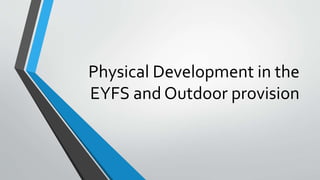
Physical development and outdoors in the eyfs pp
- 1. Physical Development in the EYFS and Outdoor provision
- 2. Welcome 1.00 – 1.15 Brief Introduction 1.15 – 2.00 Observe ‘Sticky Kids’ Session 2.00 – 2.45 Observe outdoor play 2.45 – 3.15 Feedback and Discussion
- 3. Aims • To develop an awareness of the importance of physical development in the EYFS • To observe a physical exercise programme aimed at the EYFS • To observe and develop an understanding of the physical development that is extended through outdoor provision
- 4. Moving and Handling • Children have to learn skills such as walking, balancing and not bumping into things. As well as developing the gross motor skills required to move about children also need to develop control of all the smaller muscles which move when we pick something up or put it down – these take time to develop and come through using and playing with objects such as spoons, beakers, cars, jigsaws and other playthings. From this early start children develop body-confidence which encourages them to want to push a car along a track, ride a scooter or jump in a puddle. As children develop control and coordination they eventually learn how to handle items such as a felt pen, a pair of scissors or a paint brush.
- 5. Health and self-care Through Health and Self-care children find out about the effects of a healthy life style on their bodies.This includes all the factors that affect healthy development including making healthy choices in relation to food. It also includes managing their personal needs, such as dressing, when it is appropriate.
- 6. Outdoor provision and Physical Development • The outdoor environment is a rich, dynamic and natural space for learning and development in children of all ages. Its value as an essential learning resource has been recognised by many pieces of research and more recently within the Early Years Foundation Stage (EYFS), particularly within the principle of ‘Enabling Environments’. The EYFS states: • ‘Being outdoors has a positive impact on children's sense of well-being and helps all aspects of children's development. • Being outdoors offers opportunities for doing things in different ways and on different scales than when indoors. • It gives children first-hand contact with weather, seasons and the natural world. • Outdoor environments offer children freedom to explore, use their senses and be physically active and exuberant.’
- 7. • The outdoor environment usually offers more freedom and space to move, and inspires different movement from that indoors.This is vital for young children to develop their coordination, build muscle mass and experiment with moving their bodies. • When outdoors, children have the freedom to explore and develop their physical boundaries, to take risks and to discover the real world with all their senses.This can have huge positive effects on a child’s self esteem and confidence. Outside can be liberating; children have room to be active, noisy, messy and work on a large scale.
- 8. Sticky Kids Exercise Programme • Sticky Kids is a comprehensive learning resource for the EarlyYears Practitioner.The music and movement songs helps achieve the goals set out by the EarlyYears curriculum requirements not only in Physical Development but also in other areas of learning. • Observe the session - make notes and record – consider engagement, motivation, development of physical skills, progression
- 9. Observation and Feedback • Make notes about the range of opportunities available for developing physical skills • Think about gross (large) and fine motor skills • Consider age/stage development and provision for those with additional needs • Use the physical development curriculum to identify progress Short feedback and discussion time